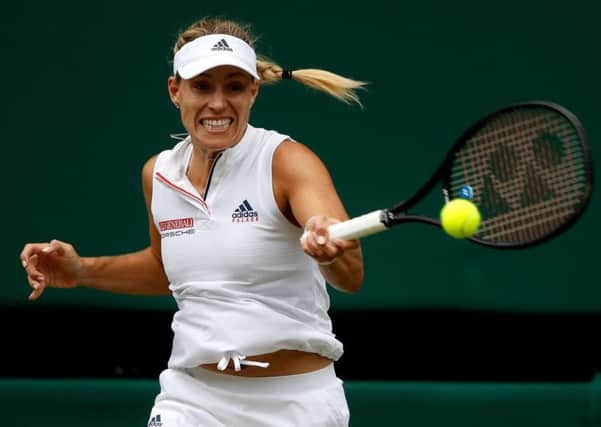Angelique Kerber and Julia Goerges aim for all-German Wimbledon final


Well, those fans desperate to acclaim a successor to the great Steffi Graf would have cared yesterday. It’s been 22 years since the last of her seven titles but this time there’s a chance of an all-German final. Angelique Kerber is the better known of the two and many people’s tip for the crown but she says that in this wide-open tournament “there are no favourites anymore” which brings her compatriot, Julia Goerges, into contention – and so it should given the sparkling shots which took the 29-year-old to her first Grand Slam semi-final. “Julia Gorgeous,” quipped one fan leaving Court 1 and I’m sure he was talking about her tennis.
“It sounds pretty cool, I think,” she said while considering the prospect of German vs German come Saturday, although obviously they aren’t there yet and Serena Williams, who Goerges meets tomorrow, will have a big say in matters. “It sounds crazy to maybe have the chance to share a German final at Wimbledon. Already it is great for German tennis. To share this feeling with Angie, with the nation, is something pretty special. It’s still one more match to go for both of us and they’ll be very tough. But it’s great to see there is a chance.”
Advertisement
Hide AdAdvertisement
Hide AdGoerges hails from Bad Oldesloe in the state of Schleswig-Holstein. Her Wikipedia page records the fact she took up tennis aged five when she realised her parents “were never going to stop talking about insurance”, their shared profession. She needed three sets to edge out Kiki Bertens of the Netherlands, 3-6, 7-5, 6-1, while Kerber beat Russia’s Daria Kasatkina 6-3, 7-5. But this match felt like a three-setter. In fact, the concluding game did – all ten minutes and 16 points of it, the former world No 1 prevailing at the seventh time of asking.
Kerber was made to fight for every point by Kasatkina. This made for an engrossing contest and one which the Centre Court, after a number of perfunctory processions by the big names, craved. Kasatkina hails from Volga where her father makes the cars of that name.
There were countless long rallies and in her terrific contribution to them she’ll wonder how she lost the points, but in many cases she overhit and double-faults were a problem.
But she also came up with the shot of the match. Even veteran tennis scribes were at a loss to describe it until Kasatkina offered “jumping dropshot backhand”. It bamboozled Kerber many times and the 2016 US and Australian Open champion needed to keep her nerve and maintain the accuracy which her exciting but erratic opponent lacked.
Cliche alert: German efficiency was well to the fore. Vorsprung Durch Technik. The crowd will remember a thrilling drop-shot duel concluded by Kasatkina attempting a return on the run blind through her legs, but shouldn’t forget that Kerber won the point.
As the second set built to its climax the match got more ridiculous. And more brilliant. Six consecutive games went against serve, which sounds careless, and there were lots of unforced errors – 30 all told from Kasatkina – while Kerber suddenly became timid. But there were also stunning winners, more long rallies, additional leaping from Kasatkina and finally just enough composure from Kerber, who paid tribute to her plucky opponent: “The match was on a high level from the first point and right at the end she was still playing so good. I had to stay positive.”
Goerges’ match on in a more windy setting maybe lacked the drama and certainly the rallies, at least in the early phase. But once Goerges had levelled she went on to produce a concluding set which fizzed with flair and flashing winners. Her breakout came all of seven years ago and phase two of the career required a complete overhaul: “new coach, new physio and a move from the north to the south of Germany”. There’s probably no need for her to contemplate selling insurance just yet.